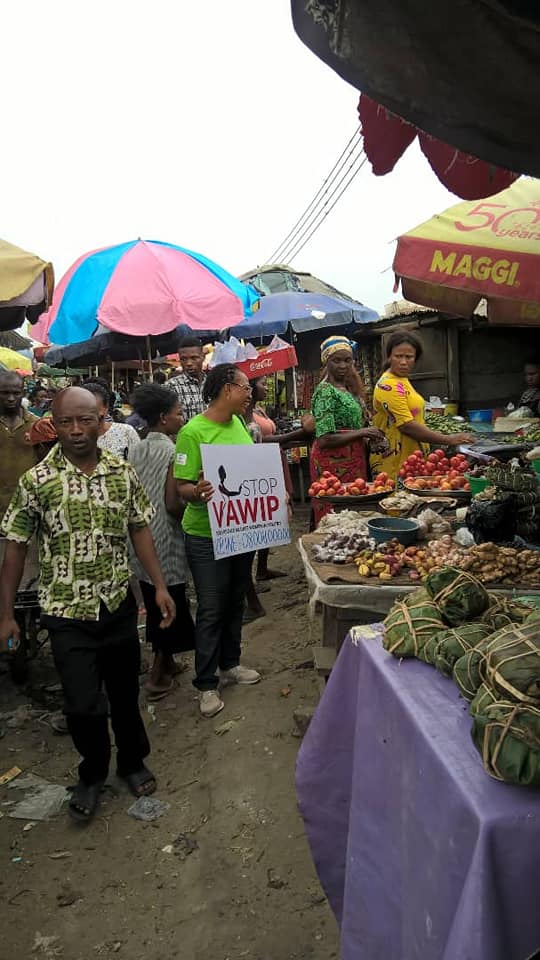Stop Violence Against Women In Politics (#StopVAWIP)
Oct 26, 2019
Story

Balance for Better – Think equal –Build smart - Innovate for change
I was invited to an Rivers State Television talk show – Feminine Catalogue hosted by Miesia Temeye Bob-Manuel and Chiccoco Community Radio Station on their Gender Issues hosted by Veronica Barakat respectively together with another discussant. The discussion was pre-International Womens' Day and continuous voters education which centered on #StopViolenceAgainstWomenInPolitics (Election) impact on the election process; a programme we were involved in. The #STOPVAWIP was a project facilitated by Gender And Development Action supported by National Democratic Institute. This program for me came late because by that time the political party primaries had ended and women could not be mentored to join the elective positions neither could we reach the political party stalwarts to give more space to women by allowing internal democracies to reign instead of handpicking candidates and imposing them on party members. The exclusion of women in elective positions in Nigeria is becoming alarming and violence plays another serious part in making women stay far away from political scenes and participation.
The objective of the programme was
- To mobilise more women to participate in the electoral process as their civic rights
- to create awareness about what constitutes violence against women in politics and facilitate the process of challenging set attitudes and beliefs around it so that women can make an informed decision concerning the elections
- to advocate to relevant stakeholders on addressing issues of violence against women in politics and
- to track and respond to VAWIP incidents during the elections and reporting these through a hotline for appropriate.
I had first-hand information on some on series of violence perpetrated during the period because I was at the Stop VAWIP Survivors Centre during the elections. We received so many reports on violence, which we verified and gave a quick response by calling the police, army or Independent National Electoral Commission control rooms for follow ups. In all of these we were particularly interested on the level of violence perpetrated against women voters during the electioneering process. These reviews gave us opportunities to recount from the reports we gathered in the survivor centre. Some of the reports were
- A woman was raped and her husband killed. The killing was politically motivated.
- 3 women were flogged for refusing to vote for a particular political party, received bruises on their bodies and their dresses torn as they ran into the bush for safety.
- 2 female adhoc electoral officers were attacked and 1 was shot in the arm
- 2 female police officers were attacked
- So many women voters had to run for safety at the hijack of electoral materials and ballot boxes
- So many were disenfranchised because of different level of violence ranging from gun and dynamite shots, threats to lives, heavy military presence in and around the communities; party thugs chant of war songs; cult group clashes to mention but a few.
In some local government women were intimated, threatened and prevented from coming out to cast their votes thereby disenfranchising them.
The calmness and successes recorded in the pre-election was thwarted by the introduction of heavily armed military personnel deployed to communities. This action by the Federal Government posed a very serious threat to armed bandits and cult boys who became deviant and threatened in their territory according to them.
We also recorded some success stories on vote buying as so many women in different electoral wards and units refused and resisted inducement to sell their votes. Women in some Local Government and communities have to sleep around the collation centres to safe guard their votes by engaging in singing, praying and eating their meals in such places.
The issues mentioned above were recorded in StopVAWIP Survivor Centre in Rivers State only. In spite of all that women passed through and the general tensed atmosphere, we advised women to be alert and report any form of violence or moves around their area through the Hotline and as well as try to go out early to cast their votes for their desired candidates and go back to their houses.
The call-in talk show provoked reactions from citizens and they showed their dismay at the spate of violence during the presidential election and hoped that the gubernatorial elections will be better.
The way forward for women is to start early to build the capacity of women who wants to participate in elective positions through mentoring and series of training to prepare them for the forthcoming elections in 2023. The time to start the work is now because over the past years the number of women in elective positions in Nigeria continues to diminish and dwindle due to different types of violence ranging from physical to sexual and psychological violence. The media has been advised to stop publishing hate & degradation speeches of women who are in politics and other articles portraying women negatively; stigmatization, name calling and labelling.
Husbands have been advised to support their wives in politics and stop the threats of divorce or divorces; threats of body harm and financial deprivations.
Women have been advised to join and be card carrying members of political parties as well as follow up on all activities of their desired parties in order to have better chances at the polls in the next dispensation. They were advised to attend meetings and make meaningful contributions to the growth of the parties. and to stop being used only for mobilization and refreshment ports only.
Internal democracies of parties have been advocated for severally and we will continue to advocate for that. The 35% affirmative action in the National Action Plan is and has never been achieved. We will not give up until we get there. Thank you World Pulse for making me choosing me as an ambassador.




